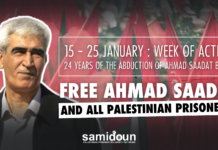 Prominent Palestinian religious and political leader Sheikh Raed Salah was seized by Israeli occupation forces on Tuesday, 15 August after they invaded his home in Umm al-Fahm, occupied Palestine ’48. Salah is the leader of the Islamic Movement in Palestine ’48.
Prominent Palestinian religious and political leader Sheikh Raed Salah was seized by Israeli occupation forces on Tuesday, 15 August after they invaded his home in Umm al-Fahm, occupied Palestine ’48. Salah is the leader of the Islamic Movement in Palestine ’48.
Police and special units stormed his home, confiscating two computers and seizing Salah. Lawyer Khaled Zabarqa stated that Sheikh Salah refuses to submit to interrogation without legal advice and noted that Israeli police are seeking to extend his detention further, saying that he is being accused of membership in a prohibited organization, activities on behalf of a prohibited organization and incitement to violence. The incitement allegations are based on Salah’s public speeches following the recent Israeli occupation attempts to impose electronic security gates on Al-Aqsa Mosque.
Zabarqa said that the seizure of Salah is part of the continued incitement against the Palestinian masses and Palestinian leaders, and that the process of incitement is led by the leaders of the Israeli state.
Salah has been arrested on multiple occasions and was released in January 2017 after being imprisoned for nine months on charges relating to a sermon he delivered in Jerusalem in 2007; he spent most of his imprisonment held in solitary confinement and was threatened with extended sentencing before release. Israeli occupation officials have also been involved in attempts, including in the United Kingdom, to deny Salah an international platform for advocacy. He has been subjected to repeated travel bans by the Israeli state.
The seizure of Salah came as Israeli occupation police announced on Wednesday, 16 August that they had arrested 72 Palestinian Jerusalemites for participating in a sit-in against Israeli occupation attacks on Al-Aqsa. An Israeli police spokesperson declared that 43 people were indicted and ordered detained until the end of legal proeedings on charges of “involvement in the disturbances” in defense of Al-Aqsa.
The Islamic Movement, Salah’s political movement, was banned in Palestine ’48 and many associated institutions closed and raided. Palestinian organizations across the political spectrum denounced the ban on the Islamic Movement as an attack on all Palestinians.
Discover more from Samidoun: Palestinian Prisoner Solidarity Network
Subscribe to get the latest posts sent to your email.




